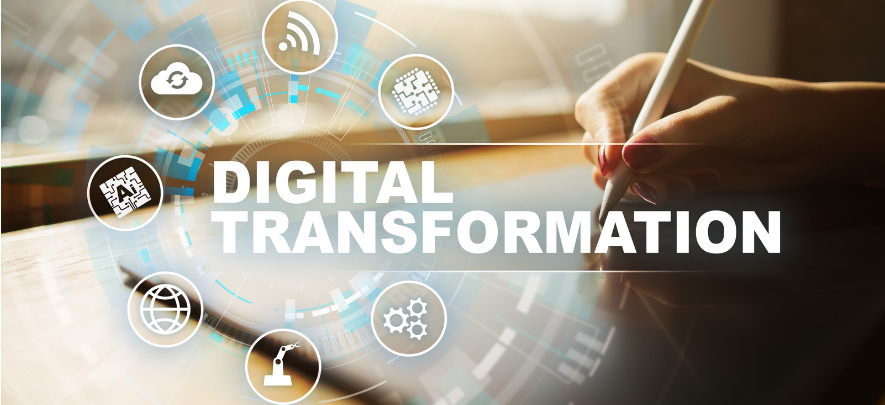Why does your business need digital transformation now?

Digital & Technology
309 week ago — 7 min read
I remember in 1994 when I bought an event company from a classified section of the Wall Street Journal. After I purchased the company, a Nextel/Motorola saleswoman came to my office to sell me a device that I could use as a mobile phone and a walky talky; to save money and to be more efficient. For some reason, I ended up buying the device. I proceeded to have a long talk with a Nextel representative about the future of mobile devices. She said that the future of computing in the next 10 years will be email, messaging, and enterprise applications. That was my first taste of digital transformation.
The same year, I started a company that allowed companies to use their credit cards online to create transactions faster and in real-time. Back then, there was one bank that allowed credit card processing online with my company. In 1996, I started a company that allowed enterprises to use a small feature/bar phone to access corporate data any time anywhere which was followed by another 10 companies I founded to digitize the way we live, work and interact in business- from m-health to m-commerce. All disruptive or transforming the way we live or do business. Any business that shifts the way it operates from the traditional mode of operation and management to the modern, technology-orientated mode of operation, undertakes what is known as ‘Digital Transformation’ or ‘Disruption’.
Whether you run a micro, small, medium, or large-sized businesses, digital transformation is absolutely imperative in order to succeed.
Whether you work in retail, automation, IT, finance, medicine, or any other industry for that matter, you need to embrace digital technology and apply an innovative business model. This will help you to appeal to a wider target audience, improve customer relations, keep up with the demands of your customers and prosper.
If you wish to stay ahead of the competition in today’s fast-changing world, you need to be able to deliver a positive digital experience to your customers. The best way to do this is to have lower operational costs and enhance the customer experience. These two factors are at the core of digital transformation. There are plenty of digital tools available for businesses to embrace, including some of the following examples:
- Slack - This is where you can improve collaboration and work flow to your employees.
- Post Planner - A social dashboard that runs within Facebook, enabling you to find, plan and post content in advance, thus boosting your reach and social media engagement
- Soonr - An evolutionary file sharing app that lets employees access files from smartphones, laptops and home PCs. Furthermore, you can create projects, assign team members to tasks and configure alerts when tasks are completed.
When technological innovations take place at a company, technology disruptions occur. When your business process moves towards modern technology, this automatically increases speed, lowers effort and cost and brings immense value to your business. As a result, your business is then able to deliver results more effectively, which naturally leads to positive word of mouth, satisfied customers and a wider clientele.
Also read: 10 social media automation tools for your business advantage
Today’s customers want increased technological capabilities combined with easy-to-use services. Technology changes the need to cater towards customer demand. When this occurs, businesses profit and customers are much more satisfied and an increased speed-to-market is met. Here are the following terms for your digital transformation journey:
1. Customer demands
This refers to providing customers with a positive experience from start to finish. When you are able to do this, you then gain customer loyalty which leads to positive word of mouth.
Also read: 4 ways to improve customer loyalty
2. Process Orientation
This refers to a positive digital experience within the workplace, such as implementing tech innovations like those mentioned above, which results in greater performance improvement and greater workplace transparency.
3. Innovation in Business
Digitizing current business models that foster innovation in products and services and cater to ever-changing business needs.
If your business isn’t embracing digital transformation yet, then the risk of losing customers, employees and worse still, dying out is high. In the age where digital technology is evolving at the speed of light, it’s never been more fundamental to embrace technological change in order to inspire productive changes and deliver value.
Six years ago, the Asian Development Bank came to me and asked me how I could help SMEs and MSMEs in the Mekong Delta Region. After I personally identified three consistent problems: Marketing, Access to Finance and Digitization; Kiu was born.
Also read: Why businesses cannot evolve without an ERP & how Kiu BMP can be your partner in growth
Kiu means “Bridge” in ancient Chinese, but in our case we want to bridge people, communities, countries and regions through digitization. At Kiu, we are all about innovation, transformation and success. Whatever your business requires, we're here to help. With a large repertoire of companies under our belts, a team of professionals-on-hand and a vast knowledge base, we're certain we can provide the services your business needs not only to succeed, but to excel in a competitive business environment.
Kiu is a digital Business Management Platform that allows businesses to interact through one single platform to manage all their business needs: customer interaction and communication, marketing, website management, banking, HR, Inventory Management and Accounting, and much more.
To explore business opportunities, link with us by clicking on the 'Connect' button on our eBiz Card.
Disclaimer: The views and opinions expressed in this article are those of the author and do not necessarily reflect the views, official policy or position of GlobalLinker.
View Steve 's profile
Other articles written by Steve Landman
Most read this week
Trending












Comments
Share this content
Please login or Register to join the discussion